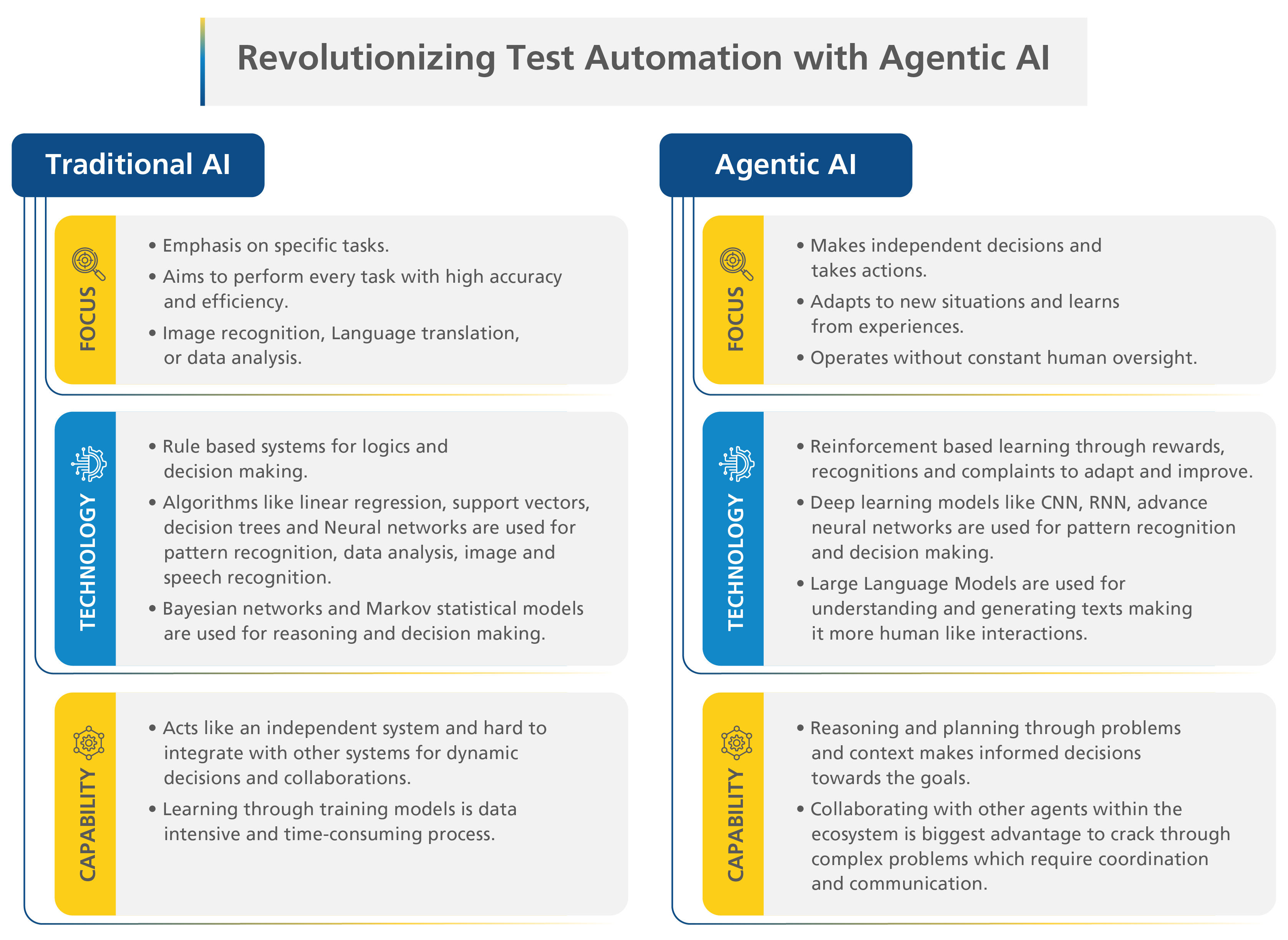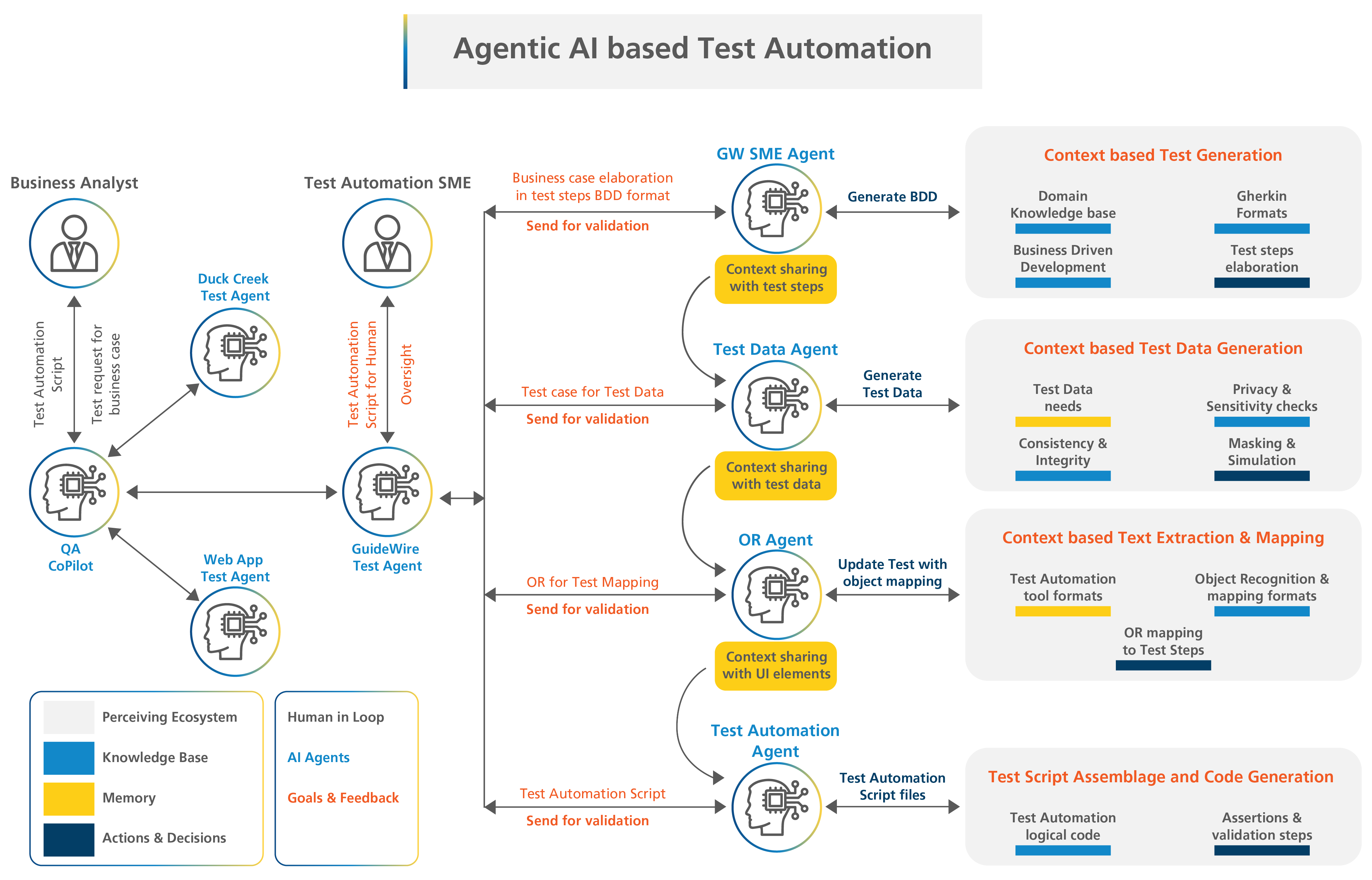Agentic AI: Revolutionizing Test Automation for Enhanced Scalability and Improved Cost Reduction
Introduction
The evolution of artificial intelligence (AI) has been a remarkable journey, beginning with early theoretical concepts in the mid-20th century to today’s multifaceted systems solving complex business problems. Today, AI systems are integral to various industries, from healthcare and finance to entertainment and autonomous vehicles.
Agentic AI refers to systems capable of making autonomous decisions and performing tasks independently. These AI agents analyze data, learn from experiences, and act without constant human oversight, enabling applications like self-driving cars, automated trading, and intelligent customer service bots to operate efficiently and effectively. The rise of agentic AI is revolutionary through its autonomous decision-making capabilities. It represents the latest frontier, promising a truly transformative impact on society.
IT organizations across the world are using this evolution as a pivot to speed up innovative solutions to the market. Towards this, test automation, which has become a key aspect for any organization that is looking at increased speed and efficiency and enhanced quality of their software, has also been impacted greatly by Agentic AI.
For instance, developing test automation scripts is a complex and multifaceted process that requires clear functional steps, the right amount of data, correct object identification properties, and validations at the right places. The perfect test automation script only becomes a reality when all these facets amalgamate comprehensively into one another. Agentic AI makes this possible by spawning agents keeping a check that each agent has performed its task at the best by doing an assessment without much of human intervention.
This blog encompasses the process of transforming test automation through Agentic AI.

Figure: A brief comparison between traditional and Agentic AI
The Role of Agentic AI in Test Automation
Developing test automation is a team activity. Each agent works autonomously, perceiving its ecosystem, reasoning about its conditions, making choices, and taking appropriate actions. Agentic AI streamlines and enhance this process through specialized AI agents that learn and adapt constantly. Central to this system is a ‘controller’ that achieves specific goals and allows seamless communication, sharing and coordination among all the agents. The controller also works as a memory hub where ecosystem-specific information, conditions, choices are exchanged to benefit other agents from the collective knowledge.

The above diagram depicts a use case wherein a business analyst intends on speeding up test automation activity with use case/requirement documents. The analyst is tasked with developing test automation scripts for a Guidewire product test scenario in the insurance domain. The agent-specific tasks are:
- GW SME Agent
This agent interprets functional requirements from the use case document and translate them into actionable steps for accuracy and comprehensiveness. Leveraging their insurance domain knowledge and Guidewire product steps for the given scenario, the agent translates these requirements into Gherkin BDD format. - Test Data Agent
This agent automates the collection and validation of data and ensures that it is relevant and accurate for comprehensive testing. The Test Data Agent autonomously adapts to new data sources and evolving structures from its perceiving ecosystem, maintaining data integrity without constant human intervention. It understands the context of test data required for an Insurance Guidewire product by masking PII information and ensuring sensitivity and security. - OR Agent
This agent helps identify and classify UI elements and objects within the application under test. This agent learns and adapts to UI changes according to the test automation tool of choice, providing more flexibility and reducing maintenance efforts. - Test Automation Agent
This agent inserts annotations and validation checks within the test scripts based on best practices and historical data. Agentic AI, with its continuous learning capabilities, can adapt to new validation needs and optimize the annotation process, reducing reliability on human expertise. - Guidewire Test Agent
This agent plans and reflects on each agent’s task by reviewing and validating outcomes generated at each step and mapping them to the desired goal, ensuring accuracy and zero bias.
Benefits of Leveraging Agentic AI in Test Automation
Leveraging Agentic AI in test automation provides substantial advantages that enhance the overall efficiency and effectiveness. These benefits help optimize resources, improve accuracy, and accelerate time-to-market.
- Cost Reduction: By automating repetitive and time-consuming tasks, Agentic AI reduces the overall cost of testing in terms of time and resources. It autonomously generates test scripts, reducing manual effort and increasing throughput.
- Continuous Testing: Agentic AI can quickly generate and update test scripts based on changes in the application, ensuring that testing keeps pace with development.
- Adaptability: Agents continuously learn and adapt to new scenarios and changes from testing outcomes, improving their accuracy and effectiveness over time.
- Scalability: Easily scale testing processes to handle larger volumes and complexities without additional human resources.
Challenges and Considerations
While Agentic AI offers transformative benefits in test automation, it also presents certain challenges and considerations.
- Implementation: Significant time and effort are required to setup up and optimize AI agents, ensuring they understand the application and test cases accurately. Also, regular updates and maintenance are necessary to keep AI agents effective, as applications evolve, and testing requirements keep changing. It involves upfront cost and resources, including investments in technology and ongoing support.
- Data Quality and Availability: High quality and comprehensive datasets are essential for any AI systems to ensure accurate and optimal test coverage.
- Ethical Considerations: Emphasizes the necessity of human oversight to ensure accountability, fairness and transparency. Human intervention is crucial to mitigate biases, validate outputs and uphold ethical standards in the automation process.
Future of Agentic AI in Test Automation
The future of Agentic AI in test automation promises even greater advancements, revolutionizing how testing is conducted. This evolution will bring smarter, more adaptive and highly efficient testing processes. Agentic AI will lead to fully autonomous testing systems and seamless integration with DevOps, enhancing efficiency and decision-making. These advancements will enable continuous testing and real-time issue resolution, making software development more agile and reliable.
It is pertinent to stay informed about the latest developments in Agentic AI by following industry news, attending webinars, and participating in conferences. Experiment with new tools and techniques and invest in training to effectively leverage these technologies in your projects, ensuring you stay ahead of the curve.
Conclusion
In this blog, we explored how the advent of Agentic AI marks a significant breakthrough in the field of test automation. By leveraging advance generative AI frameworks and multi-agent systems, this innovative approach offers unparallel efficiency and accuracy.
As organizations increasingly adopt agile methodologies, Agentic AI emerges as a crucial enabler, fostering a more dynamic, responsive and high-quality software development process.
Latest Blogs
A closer look at Kimi K2 Thinking, an open agentic model that pushes autonomy, security, and…
We live in an era where data drives every strategic shift, fuels every decision, and informs…
The Evolution of Third-Party Risk: When Trust Meets Technology Not long ago, third-party risk…
Today, media and entertainment are changing quickly. The combination of artificial intelligence,…




